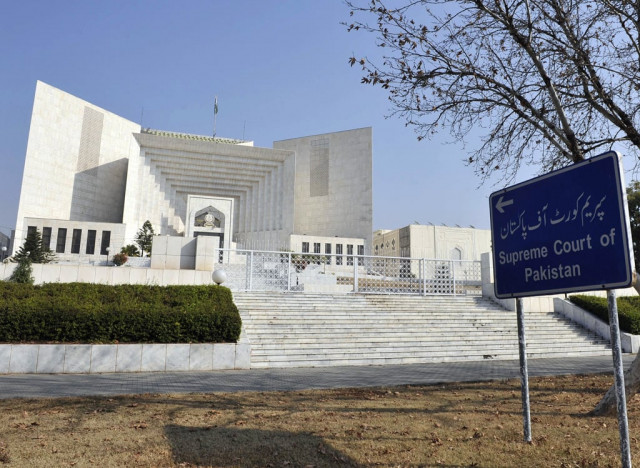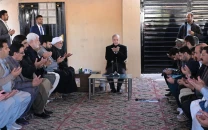‘Judiciary can root out causes of case delays’
Petitioners highlight eight acts, omissions of high courts

Supreme Court of Pakistan. PHOTO: AFP
A group of five young lawyers – Umer Gilani, Raheel Ahmed, Attaullah Hakim Kundi, Haider Imtiaz and Hadiya Aziz – has submitted written arguments in the Supreme Court in the matter related to judicial reforms. All high courts as well as the federal government have already submitted their replies.
The gist of petitioners fresh submission is that instead of relying on new legislative tools, the judiciary is fully empowered to take steps in providing expeditious justice and one of the key reasons of delay in the dispensation of justice is ‘lack of accountability within judiciary’.
The petitioners have identified at least eight acts and/or omissions of the high courts.
About 40,336 cases pending in SC
These include are non-enforcement by the courts of the law of costs by courts; (ii) non-enforcement by the courts of the law of perjury; (iii) lack of judge-driven case management; (iv) absence of maximum time-limits for suits; (v) excessive interference in the progress of trial by appellate and revisional courts; (vi) dilution of regulator powers of trial courts through case law (vii) non-availability and non-disclosure of vital judicial statistics; and (viii) absence of an updated and comprehensive judicial policy.
On the basis of this diagnosis, the petitioners have sought certain directions and observations from the Supreme Court. Article 189 states that any SC decision is binding on all other courts in Pakistan, to the extent that it decides a question of law or is based upon or enunciates a principle of law.
In exercise of this jurisdiction under Article 189, observations issued by the SC regarding the basic principles of procedural law can have a great impact.
The petitioners states that during the last 3 years, the Lahore High Court (LHC) imposed costs of litigation in only three cases, the total amount of costs awarded being Rs85,000. The total number of cases decided by the LHC during this period was over 48,000.
During the same period, courts subordinate to the LHC awarded costs of litigation in 590 cases only, the total amount of costs awarded being Rs1816,000. Tribunals and special courts subordinate to the LHC awarded costs in 6,950 cases, the total amount of costs being around Rs179,000,000.
The total number of courts and tribunals subordinate to the LHC is more than 2,400. The total number of cases decided by these courts and tribunals during this period was well over 8400,000 cases.
“The data from the province of Punjab shows that provisions of the Code of Civil Procedure regarding imposition of costs were enforced in less than 0.1 per cent of all cases”
In five years, number of pending cases in SC have doubled
Likewise, over the past three years, the entire Sindh judiciary, including the Sindh High Court (SHC) itself, awarded costs amounting to just Rs729, 000. The situation is not much better in any province.
The petitioners said this state of affairs is deeply disturbing because it is clearly a violation of the letter and spirit of Sections 35 and 35-A of the Code of Civil Procedure, 1908.
Legal provisions of the CPC as well predecessors of the code have always required imposition of actual costs upon the losing party. In 1922, Section 35A, which provides for punitive costs, was added to the CPC with the aim of strengthening this provision”
“The LHC did not prosecute anyone for perjury in 3 years while the courts and tribunals below it carried out prosecution for perjury in roughly one case of one lac cases decided by them.”
The SHC’s reply disclosed that over the past three years, the court and its subordinate courts have not prosecuted anyone at all for perjury.
“The situation is not much better in any other province. Clearly, the on-ground reality is that the courts of Pakistan have largely abdicated their duty to enforce the penal provisions,” it said.



















COMMENTS
Comments are moderated and generally will be posted if they are on-topic and not abusive.
For more information, please see our Comments FAQ